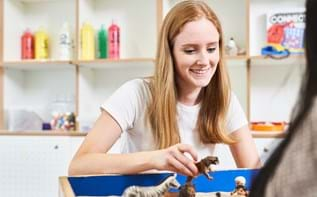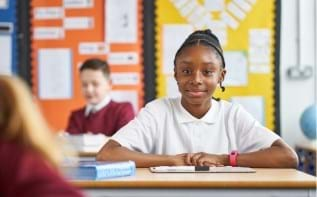Lessons from New Zealand on returning to school in the 'new normal'
As schools in England and Wales begin to open for the new school year and adjust to the 'new normal', and with schools in Scotland already back, school staff, children and young people could be experiencing a wide range of thoughts and emotions. Dr Fiona Pienaar, Senior Clinical Advisor at Shout, shares her experiences from the other side of the world.
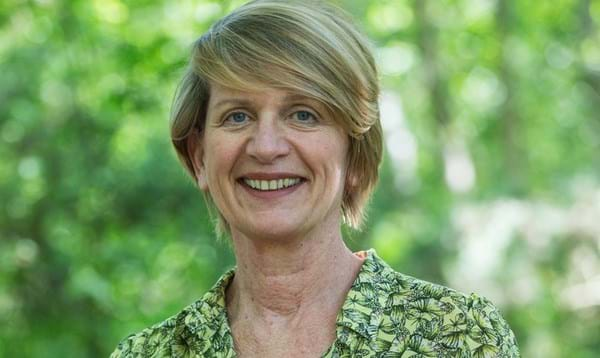
For the majority of pupils and staff, this may be the first time they have stepped back into a school environment for six months and it will be quite understandable if there is hesitancy and anxiety about this new phase.
When schools in New Zealand opened back up on 18 May 2020 after the first Covid-19 lockdown, initially, around 80% of pupils returned to school. For those who didn't transition back, staff reached out to families to try and understand the challenges preventing them from taking this step, exploring what they could do to support them overcome any hurdles.
Over the first few days, when children were asked what it was like to return to school, not surprisingly, many spoke of their excitement about reconnecting with their friends, classmates and teachers — describing how much they had missed them. Of course, this wasn’t the case for every child and young person. Some pupils were already dealing with adverse childhood experiences in their lives and staff were well aware that there would be students whose mental health had been impacted as a result of the lockdown and that some would need additional support. There was an expectation and an understanding that behaviours might be challenging, and emotional responses concerning, as children and young people adjusted to this new normal.
It was vital here in New Zealand — as it will be in the UK — to continue to keep an eye on those pupils who may be, or clearly are, struggling. Not all children and young people act out when they are struggling, and it’s important to be alert to those who are withdrawing and isolating as well. To deal with a potential increase in mental health challenges, many schools here in NZ made sure that they had the necessary professional mental health and wellbeing support to call on if needed.
There was, and continues to be, a lot of helpful advice published to support school staff as they welcomed students back to school in New Zealand. This included advice from Peter O’Connor, a Professor in Critical Studies in Education at the University of Auckland, who suggested a number of ways to best support pupils returning to school, including:
- taking the time to re-establish relationships with students
- spending time on children’s wellbeing, rather than rushing back to routines and trying to catch-up. This may well pay dividends later in terms of re-engaging students with learning
- creating opportunities to directly address what has happened and changed in the world – without making a big deal out of it (taking into consideration, of course, ages and stages of development and with a constant eye on wellbeing).
School staff were aware that anxieties could be triggered and manifest in various ways for some considerable time and making sure that pupils feel able to ask questions and have the opportunity to discuss their experiences under lockdown was key to helping them process this unique period in time.
Other advice included:
1. Providing opportunities for your class to talk about resilience
There will be many children and young people who will have discovered that they have resilience; that they have been able to both survive and thrive through finding their personal strength and self-awareness during this period. Identifying, discussing and acknowledging this positive growth and awareness is something teachers (and parents and carers) could do.
It’s not a case of insisting that everyone will have grown as a result of this experience, but perhaps asking children and young people strengths-based questions about what they have noticed about themselves during the lockdown experience. Giving them the opportunity to hear what others have to say about how they have coped, can trigger them to think about, identify and acknowledge their own resilience and determination.
- How did you cope during lockdown?
- What are you proud of about yourself?
- What do you think your strengths are?
2. Referring families who might need additional support
While a return to school can provide a sense of routine, safety, connection and space, staff should also be aware that the social, economic and emotional stressors that have been exacerbated by this pandemic may mean that some pupils and families need additional support and would benefit from being referred to specialist services.
3. Supporting the mental health of school staff
Critical in the return to school was the need to acknowledge the strain on teaching staff who themselves have had to live through the lockdown while continuing to educate from a distance. Their wellbeing and mental health are critical to how children and young people will emerge out of this period.
While schools in New Zealand have acknowledged that attending to their students' wellbeing remains a priority, teachers and all school staff need to know that their wellbeing is as important, and that pastoral care extends to them too. This includes making sure that staff:
- check in with one another; are kind and compassionate
- encourage and model clear communication so that everyone is aware of plans and processes
- look out for those who are struggling and provide support
- signpost to services where necessary.
On 12 August, Auckland, New Zealand was placed under a Level 3 lockdown in response to a new outbreak of COVID-19 beyond the border quarantine facilities, meaning schools would be closed once again for a period of 2 and a half weeks while authorities and the public worked to contain the spread. This time around schools and the education authorities were, of course, far more experienced and equipped to manage both the process and the consequences. This highlights how, globally, we are likely to be dealing with the fallout from this pandemic for some time to come and what a critical role schools and educators will continue to hold.
Dr Fiona Pienaar is Senior Clinical Advisor to Mental Health Innovations and Shout. She is currently based in New Zealand.
This blog was written in a personal capacity and does not necessarily reflect the view of the organisation.
News & blogs

Place2Be announces Arts & Minds Gala featuring Alistair Petrie, Katie Melua and LUAP
The gala will bring together 200 guests for an evening to remember, and raise vital funds for children’s mental health.
Read more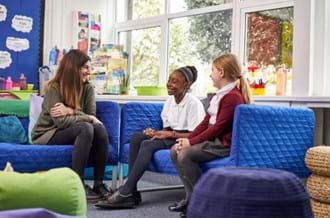
Training as a child counsellor in a Place2Be school
We sat down with Adele to learn more about her experience of training as a child counsellor with Place2be.
Read more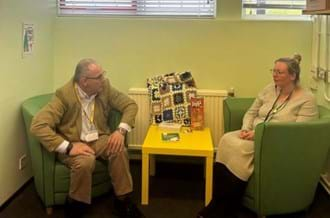
Harlow MP sees impact of our embedded service during school visit
Robert Halfon visited Stewards Academy on Friday 19 April, gaining insight into how Place2Be’s service supports students.
Read more


